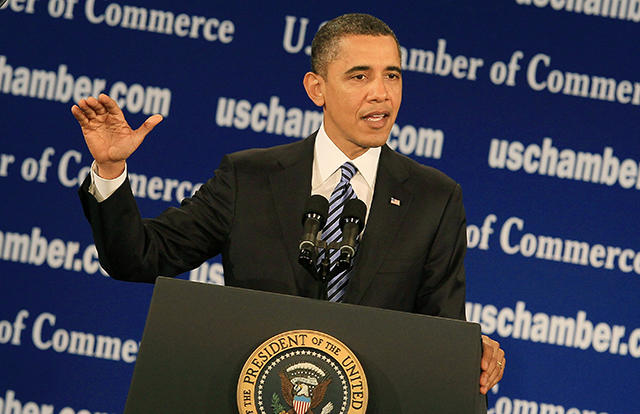How the Chamber of Commerce Boosts Big Business, Not All Americans
Genevieve Wood /
Responding to President Obama’s most recent State of the Union address, Tom Donohue, the president of the Chamber of Commerce stated, “We can’t afford to double down on the failed policies of tax, spend, regulate, and mandate.”
Really?
Increasingly, the Chamber and the Business Roundtable are proving to be friends first of big business, not struggling American workers or would-be entrepreneurs. From the Gang of Eight Amnesty bill to the failed stimulus, to subsidies for Solyndra-style green energy programs, the Chamber and others in the business lobbying community increasingly support legislation that does those very things.
To be fair, the Chamber’s mission statement doesn’t include ensuring there is a level playing field on both Main Street and Wall Street and that the American taxpayer isn’t subsidizing the activities of big business. But considering it was also the Chamber who launched an effort called the Campaign for Free Enterprise to bring attention to “rising taxes” and “exploding deficits,” it’s fair to point out where their efforts, and those of others, seem to be at odds with such claims.
Let’s start with the debate over immigration reform. The Chamber has claimed the U.S. needs more low-skill immigration because Americans are not “qualified” or “willing” to do such work – despite the fact there are roughly 10 million unemployed Americans. Greg Brown, Chair of Business Roundtable’s Select Committee on Immigration, recently stated that “America’s business leaders believe fixing our immigration system is essential to a healthy, growing economy.” The problem? The legislation both the Chamber and the Roundtable support takes an amnesty-first approach that, if enacted, would cost the American taxpayer trillions of dollars. That’s hardly a hand up to an ailing economy.
What also costs the taxpayers is a growing debt derived from government spending more than it has — and that means fewer jobs, lower wages, higher interest rates, and a burden on the next generation from which they may never recover. But as Heritage analyst James Sherk has noted, “The Chamber has no principled opposition to government spending. It happily lobbies for government spending—such as the stimulus—when that spending goes to its members.”
A good example is the Export-Import Bank which gives taxpayer-subsidized loans to U.S. exporters – you might call it a “Fannie Mae for exporters.” The Chamber and National Association of Manufacturers (NAM) both support this corporate welfare program. When President Obama reauthorized Ex-Im in 2013, NAM cheered that “small and medium sized manufacturers will greatly benefit…” Yes, small manufacturers like Boeing and General Electric.
When legislation that would create a new tax, jeopardizing the future of thousands of individuals and small businesses who make a living selling their products and services online, known as the Marketplace Fairness Act (Internet Sales Tax) was being pushed through Congress this past year, business lobbyists, including the Chamber, Amazon.com and the Consumer Electronics Association, were some of the bill’s biggest proponents. Good for Amazon? Yes. Good for the local artist who is selling her work on Etsy? Not so much.
And what about one of the largest invasions into the private sector in the country’s history, the Affordable Care Act, aka Obamacare? Who is fighting the good fight there? The Business Roundtable? The Chamber? No, if recent statements by the heads of both are any indicator, they have given up.
The chairman of the Business Roundtable, Randall Stephenson, who is also the chairman and CEO of AT&T, suggested Obamacare was now one of the “key entitlements” like Social Security and Medicare, and that what was needed was “clarity” on the rules and regulations. Read: How do we just go ahead and work Obamacare in to the price of doing business?
And while calling for Obamacare’s repeal early on, Donohue began to back step in January, saying in a speech, “The administration is obviously committed to keeping the law in place, so the Chamber’s not out opposing it.” He went on to say that the Chamber would continue “working pragmatically to fix those parts of Obamacare that can be fixed while doing everything possible to make regulations and mandates as manageable as possible for business.”
And there lies the rub. Whether through outright lobbying for corporate welfare programs or backing down on onerous laws such as Obamacare, business lobbying groups, for all their talk about free markets and free enterprise and economic freedom, are too often ultimately not in the game for the American worker or individual entrepreneur on Main Street, but for the big guys on Wall Street.
Big business can afford all the lawyers, accountants, record-keepers, and lobbyists that are needed in an increasingly regulated and mandated business environment. The average worker and small business owner cannot. Many corporate giants don’t want a level playing field. Instead, they want to be the only players on the field. The Chamber and others will likely disagree, but their actions in Washington speak louder than words.
UPDATE: An earlier version of this column cited a higher number of unemployed or underemployed Americans.

